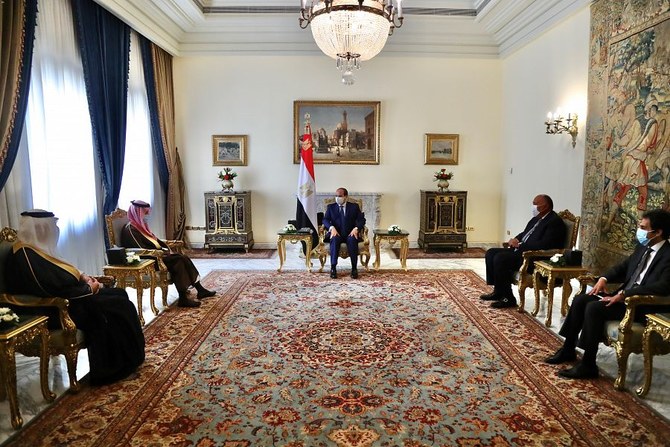CAIRO/ISTANBUL: Saudi Foreign Minister Prince Faisal bin Farhan on Monday asserted the Kingdom’s support for the Egyptian position in Libya.
Expressing his hope for a ceasefire in Libya, he stressed the need for a political solution and spoke against external interference in the conflict.
“We will continue the coordination between those who have not tried to address this challenge. We will be in constant contact and we will be one hand to achieve the security and peace of the region,” Prince Faisal said.
His remarks came as pro-government Turkish media reported that Ankara is expected to send F-16 fighter jets and attack helicopters to Libya to support Fayez Al-Sarraj’s regime.
According to analysts, the move is thought to be in retaliation against the Egyptian Parliament’s July 20 decision to permit the deployment of troops outside the country, and Cairo’s threats to attack Turkish-backed forces in Libya.
The Saudi minister's remarks at a joint press conference with Egyptian Foreign Minister Sameh Shoukry followed a meeting earlier with Egyptian President Abdel Fattah El-Sisi.
Prince Faisal conveyed the greetings of King Salman and Crown Prince Mohammed bin Salman to the president, and held a session with Shoukry to discuss the relations between the two countries and the developments in the region, especially in Libya.
Shoukry told the press conference that Egypt would not allow the crossing of red lines in Libya, stressing that the Libyan Presidential Council needed to be reconfigured to operate under the supervision of the elected parliament.
He reiterated Egypt’s call for a ceasefire and said Cairo was seeking to restore peace in Libya and stop the military escalation.
He also stressed the importance of restarting the country’s oil pumps, and voiced his regret at the lack of political will to reach a solution.
In Cairo, journalist and political expert Ali Al-Sayyid said Egyptian-Saudi relations were currently at their best in years, and represented balance and stability in the Arab world.
“The fate of the two countries is one, and this one fate depends on both countries having one vision and idea that seeks to support the Arab world during the problems it is currently facing,” Al-Sayyid said.
-----
READ MORE: Egypt’s El-Sisi wishes Saudi Arabia’s King Salman a speedy recovery
-----
“What threatens national security in Libya threatens Egypt and Saudi Arabia. The national security of both countries is one,” he added.
Turkish journalist Metehan Demir recently said in a televised interview that the country was preparing to send aircraft to strategic locations like Al-Watiya airbase, in case Al-Sarraj’s forces launch an operation in Sirte and Al-Jufra in early August.
Another pro-government analyst, Hasan Basri Yalcin, also claimed that Cairo was set to deploy aircraft to support its land forces in the region, and added that Turkey would inevitably use its F-16s to preserve aerial control.
Sinan Ulgen, a former diplomat and the chairman of Istanbul-based think-tank EDAM, said it would make sense for Turkey to do so.
“The main question is that once Turkey decides to forward deploy its F-16s, how it is going to protect these very expensive machines,” he said.
Seth J. Frantzman, executive director of the Middle East Center for Reporting and Analysis, said Turkey may also seek to deploy combat aircraft to Libya in response to Russia increasing its own number of warplanes in the region.
“Turkey has prodded the US to support it in this endeavor and it appears that US Africa Command statements condemning Russia for deploying aircraft is part of supporting Ankara's position,” he told Arab News.
According to Frantzman, this means Turkey may feel empowered by the US to deploy more forces.
“This is the model that Turkey used to escalate in Syria and Libya. However, Turkey has rarely based its F-16s overseas, so deploying them to Libya would be a major step. It would show that Turkey intends to stay for the long-term in Libya,” he said.
Frantzman thinks that having Turkish and Russian warplanes in proximity in Libya could lead to the possibility of a clash over Sirte, and shows how Turkey and Russia are supplanting the former US role in the Middle East.
“Unless Cairo and others decide to step up, they will be left out in a region that is rapidly being dominated by Ankara, Moscow and Tehran,” he said.



























